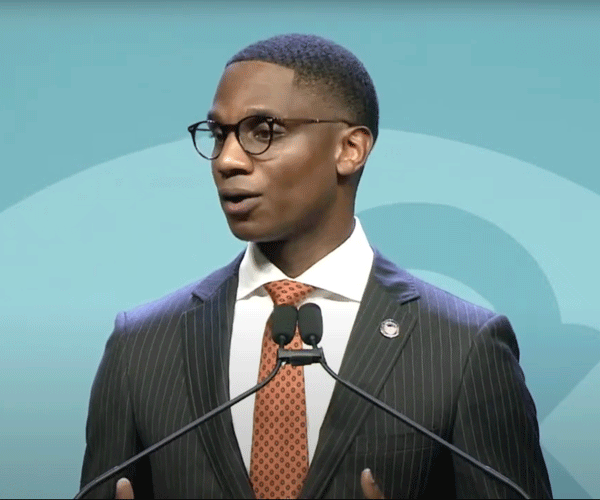Ed FitzGerald couldn't wait to take charge.
Within a week of his election as Cuyahoga County's first executive, he launched an "integrity audit" of county government. He asked lame-duck county officials not to hire, promote or give job protection to anyone without consulting him. And he debuted a new website,
onecuyahoga.com, where anyone — not just people who know people — could apply for a county job or report a concern about the government.
A week later, FitzGerald met with American Greetings executives to try to convince them not to leave their Brooklyn headquarters. He audaciously called a press conference with interim auditor David Reines and announced 18 layoffs and firings. FitzGerald doesn't take office until Jan. 1, but he was already governing.
FitzGerald's restless striving has impressed a lot of people — and alienated many others. The 42-year-old former FBI agent won the most powerful political job in Northeast Ohio after only three years as Lakewood's mayor. He jumped into the race in December 2009, just eight weeks after Issue 6 — which he opposed — created the job. When bigger names shivered and backed off the diving board, FitzGerald's big leap made all the difference. He churned out position papers, lined up endorsements and streaked to victory in the Democratic primary.
Some thought FitzGerald's cameo appearance in the Jimmy Dimora indictment might sink him. But he answered opponent Matt Dolan's TV barrage with aggressive direct-mail flyers counterpunching Dolan as a mudslinger. FitzGerald also persevered through a more personal trial: In mid-October, his 17-year-old son, Jack, was diagnosed with lymphoma. FitzGerald's 15-point victory over Dolan didn't win over critics skeptical of his ambition or his membership in a scandal-tainted Democratic Party, but his campaign revealed another character trait besides his ambition: his resilience.
Twice during his two months as executive-elect, Fitzgerald sat down with Cleveland Magazine to talk about his plans, his trials this past fall, his relationship with county prosecutor Bill Mason and the ways he's aided the FBI with its corruption investigation.
Q | You're about to start a
four-year term. Four years from now, how should voters judge whether you've been successful?
A | First, they need to make a determination about whether or not we restored high ethical standards — not just rhetorically, but implementing them. Secondly, if we consolidate the functions of county government, make it smaller and more efficient. Third, if we have a coherent economic strategy. Fourth, if we're able to keep the commitment we've made to the less fortunate in the county through the efficient providing of human services.
Q | The first week after the election, you got to work on several initiatives. Why was it important to begin before taking office?
A | Because we're really in a crisis of confidence. People don't believe [in the county government] — and they shouldn't, because of everything that's happened in the last couple of years. [The special auditor, new website and letter to the outgoing county officials] all are being done openly, and they're all about including people that aren't the same old cast of characters.
We're not taking for granted any of the processes of the previous administration. It doesn't mean that they did everything wrong. They didn't. But I think the expectation is that we're going to bring new people in, and they're going to take a fresh look.
Q | Several current county employees have been identified in some way in the corruption charges. How will you decide if they will keep their jobs?
A | It depends how they've been identified. If they're identified as a witness, then that's one thing. We're certainly going to look at any of the information that the FBI or other investigations have brought to light. We will incorporate that into the decisions we make about who's going to be suspended, who's going to end up being terminated and who's going to be retained. We're going to do that without any fear or favor. It'll make some people upset, and you just have to let the chips fall where they may. I don't care who they're related to. I don't care what their political activity has been. It doesn't matter to me.
Q | How must the Democratic Party change?
A | The county party needs to be identified with good government. It needs to learn to say no to people who might have been active Democrats but are not good public servants. It can't wait until a newspaper or a law enforcement agency puts pressure on them. That's difficult to do because the path of least resistance in politics is usually to try to get along with everybody if they happen to be in the same party with you. We just can't do that anymore. We have to have our own reform agenda and carry it out. That means you're going to lose friends. And that's what a responsible party does.
Q | How did you first find out you were mentioned in the Dimora indictment?
A | Somebody called me — an attorney who said that they thought that it was going to be coming out the next day. Then I saw it. Right away, I knew it was going to be used politically.
One of the things I pride myself about is that I don't get rattled very easily. I told the whole campaign staff, "Listen, I can't control the timing of things. But the substance of it is not anything I'm concerned about. It's not anything that's surprising to me. A lot of people are going to pick on it, and they're going to get all crazy about it, and that's just not how we're going to respond to it. We're just going to be open about it. We're going to take the beating for a while, and that's OK, and we'll be all right."
We were just transparent about the process [of leasing the Winterhurst ice rink]: This is what we did, and there isn't anything we could have done differently as far as I know. I had to weather it until it was over.
Q | Did you say it wasn't a surprise to you?
A | Yeah, because I was pretty certain that Bill Neiheiser was eventually going to be indicted. I had talked to the FBI about it. I talked to the FBI about a lot of things the last couple of years. So I always thought that there was a potential that my name would surface as a witness. It had already been in The Plain Dealer that Neiheiser was under investigation and that he had a contract with the city of Lakewood.
Q | What else did you talk to the FBI about?
A | Some of it is things that they're still investigating — not to do with Lakewood. I've talked with them about any observations I might have had about the way various county employees or officials might have gone about their business.
One of the disadvantages I've had in terms of being able to provide information to [the FBI] is that, as they know, I've conducted myself in such a way that corrupt individuals were not going to approach me with something. And they know that, and they've confirmed that with me.
In terms of giving them a general lay of the land of who players are, I'm always open to giving them any insights I have.
Q | Your son, Jack, was diagnosed with lymphoma. How did the news affect your campaign, and how is it affecting you now?
A | We didn't talk about it at first because it was private and I didn't consider it to be anybody's business. But one of the things about cancer is it's not really a private disease. His whole high school had to be notified because he wasn't going to be there. I learned you can't deal with it privately.
He was hospitalized immediately. So I asked my campaign staff to step up and find somebody else to speak for me at some of the events. I basically did not campaign for the last two weeks or so.
When he's hospitalized, I spend a few evenings a week at Rainbow [Babies & Children's Hospital], and then my wife and I basically take turns during the day. We juggle it like people juggle everything. When he's out of the hospital, he tries to get to school as much as he can. We're trying to get him to graduate on time because all his college application stuff is going on now.
[His prognosis is] good. They think they caught it early. It's been an education for me about cancer because my father died of lymphoma, but I wasn't as involved in what his medical care was. But [because Jack is] young and still growing and healthy, his cure rate is pretty good.
Q | The county faces a deficit if the state's budget shortfall causes it to cut funds to counties. How will you respond?
A | We're going to have a very methodical, analytical process about shrinking government. The positions that end up being eliminated, it's not all because of ethical issues. I think it's going to be because of consolidation and inefficiencies. There is an imperative to shrink the size of government because we've got to find budgetary capacity to do economic development and to fund the scholarship program that we want to do. The budgetary deficit just means that there is a little added pressure there.
Q | The transition committee said the county can save $100 million a year, mostly by consolidating procurement and information technology and standardizing employee benefits. Do you think that's realistic?
A | It's too soon to tell. I think we can save a significant amount of money. How soon we can implement it is the question, especially with IT. A migration of IT services is not something that's done overnight because it has to be a seamless transition.
Q | You're going to take over the county's partnership with MMPI and the convention center and Medical Mart. What are your goals for the project and your concerns?
A | One of the jobs of the county executive is going to be to promote Cuyahoga County as a business destination. The Medical Mart is going to be one of our major selling points if it's a success. So I'm going to take an active role trying to promote it to the medical industry across the country. I also want to make sure that the construction process itself is open and transparent and that it comes in on time and on budget.
Q | You've talked about unifying the county's 59 towns in terms of resources and strategy. How will you do that?
A | We're going to have a lot of direct contact between myself and the mayors. I'm going to ask them, "Identify all the services you provide, and think about ones that you believe could be done in any kind of regional or collaborative way." One of the Cabinet-level positions I'm going to have is a director of regional collaboration. His or her job will be to identify those opportunities and try to be a catalyst for them.
Q | Black political leaders argued that the charter might dilute black political power. Yet when Ellen Connally argued that diversity was one reason she should be council president, others were critical of that. How can the new government make racial differences advantageous and overcome these divides?
A | I have a job to do to personally address it as much as possible. I did try to during the campaign. I spent a lot of time on the East Side, and I think it's reflected in our vote totals. We got probably 80 percent of the African-American vote.
I have a commitment to having very open communication and trying to move to a post-racial — to the extent that that's possible — way of governing.
I think I have a responsibility in terms of people I hire for the administration to make sure that it's a diverse group of people. That's not out of any number counting. You'll have a better administration if you're hearing from people that come from all different parts of the community.
My advice to the council is that they don't become too parochial in their concerns. Urban policy needs to be important to suburbs. People are deluding themselves if they think what happens to a child who's born in Hough is not going to be relevant, economically or civically, to somebody that lives in Westlake. By our words and policies, we have to show that we believe everybody in the county is connected with each other.
Q | Your critics say you're too ambitious. They look at you leaving Lakewood before your first term's up, and they say you'll leave for some higher job.
A | I've been involved in Lakewood city government since my 20s, and I'm 42. So I wouldn't say that I was at a feverish pace. I had a lot of mixed feelings about leaving during my term. But I basically got done what I set out to do as mayor. When I was running the first time, I said, "I will probably not run for a second term." I ran because I felt that the city was being mismanaged, and there were certain things I wanted to do to get it back on the right track.
Q | Did you have a dispute with Bill Mason over Issue 6?
A | We weren't on the same side of it. I talked to him about it. He told me that I should be for it. I told him I didn't think it was well-drafted. I expressed to him all the problems I had with it.
Bill and I have a cordial and professional relationship. We're not personal friends or anything like that. When I ran for mayor, Bill did not endorse me or support me. I was elected to the City Council without Bill's help. When I first talked to Bill about running for county executive, he advised me not to do it and was not supportive.
I started as a prosecutor under Stephanie Tubbs Jones, and I eventually was a prosecutor under Bill. But he doesn't look for my permission to what he does politically, and I don't look for permission from him for what I do politically.
Q | In your campaign office, you had a Robert Kennedy poster on the wall.
A | It was something I'd bought when I was 15 years old. I sent away for it from the Kennedy museum. I came from a big Irish Catholic family. I was the seventh of eight kids, and Robert Kennedy was the seventh of nine kids. We had a whole lot less money than they did, but I kind of understand their ethnic background.
[Like the Kennedys, I think] government has a special responsibility to try to make it a just society for people that are born without advantages so they'll have an opportunity to make it into the middle class and get an education. That's what the Democratic Party stands for on its best day: No matter what circumstances you're born into, you can achieve anything, and the government does have a role in that.
I directly have tried to model myself on Robert Kennedy about this: It's important to talk about the plight of the poor with all audiences, including affluent people in very comfortable circumstances. We have a tremendous poverty rate in this county. We have children being born into very difficult circumstances, whose chances of succeeding in life are slim. Part of the county's mission is to try to address that.
I think universal pre-kindergarten programs for children from the day they're born until age 5 are so important. With the state's cutback on that funding, it's something I'm going to try to advocate for in Columbus. I want to find local resources, public and private, to support those programs.



